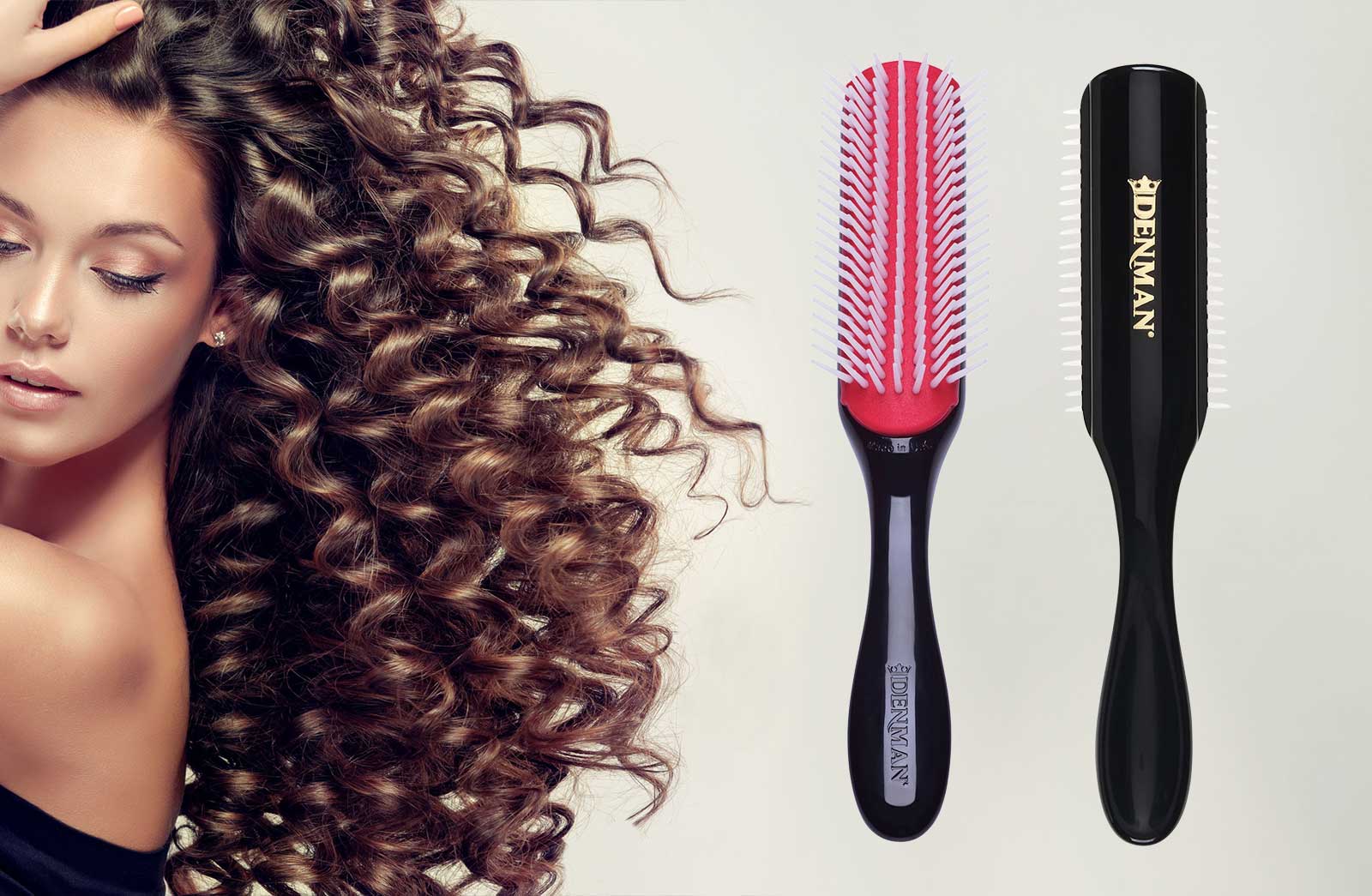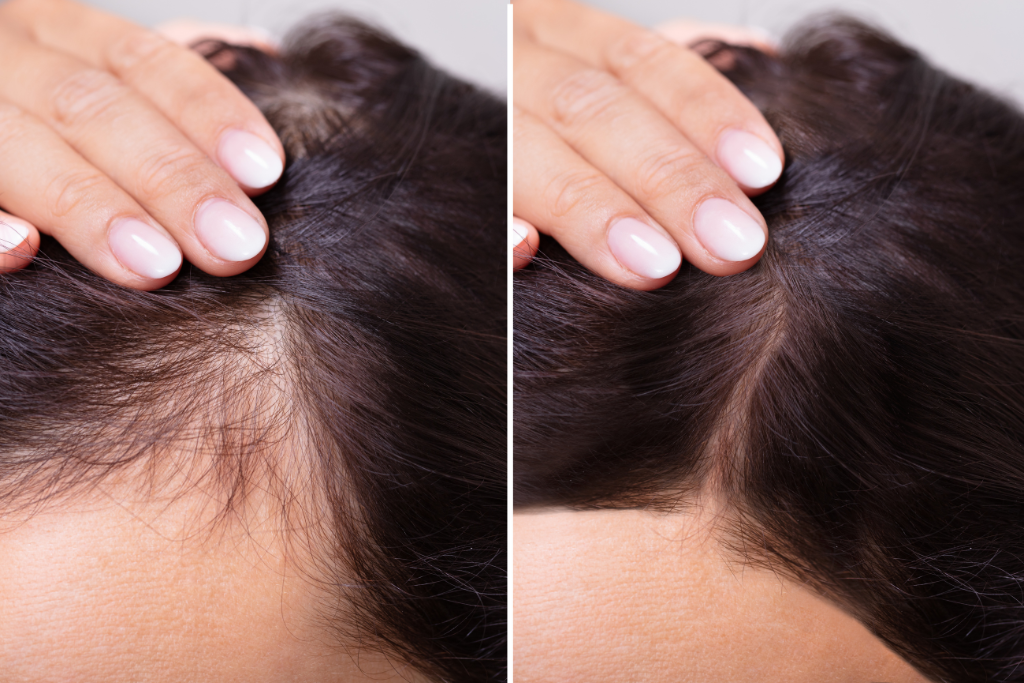Step into the world of natural hair care, where the secrets to achieving thick and healthy hair can be found in your own kitchen. In todays fast paced society our hair often faces challenges such as stress, pollution and harsh chemicals. That’s why more and more people are turning to remedies for their hair care needs. This blog post is dedicated to exploring the wonders of DIY hair masks designed specifically to promote hair growth and thickness.
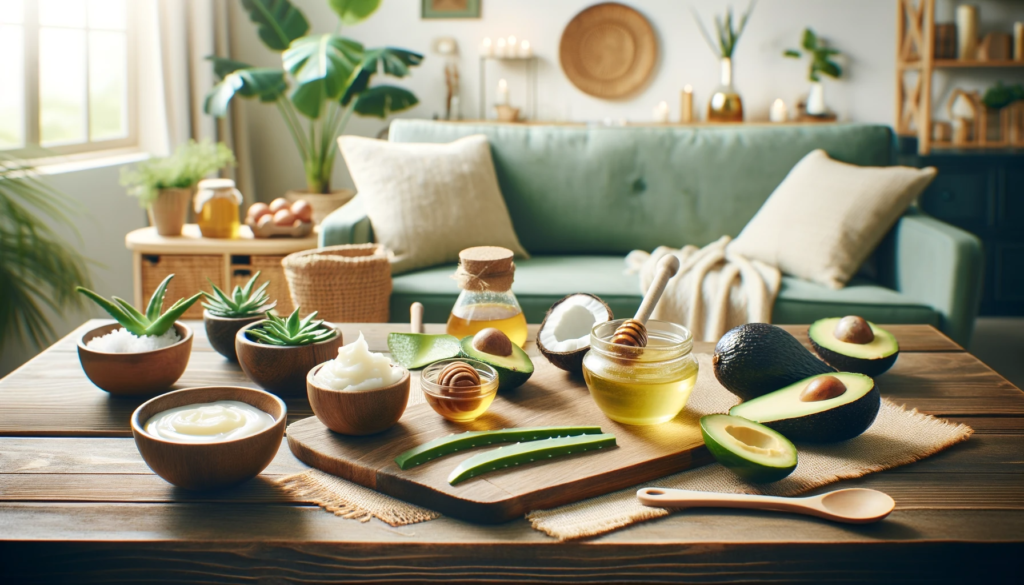
Our hair is not a fashion statement; it serves as a reflection of our well being. Unfortunately many of us struggle with issues like thinning hair, excessive shedding and lackluster strands.. Here’s some good news; Mother Nature has provided us with an abundance of ingredients that can help address these concerns. Throughout this journey we’ll delve into the world of hair masks that not only nourish your locks but also stimulate growth and enhance thickness. These masks are not effective. Also offer a chemical free approach that is budget friendly and enjoyable for taking care of your precious tresses.
Discover how you can effortlessly combine powerful natural ingredients from the comfort of your own home to create potent hair masks. Whether you’re seeking a solution for promoting hair growth or aiming for gradual improvement in thickness over time, we’ve got you covered.
For those who don’t want to use eggs keep reading as we unveil a range of recipes that cater to yor specific preferences.
So lets dive into this journey of natural hair care and explore how effortlessly you can show your hair the love and care it deserves with DIY hair masks!
Section 2: Benefits of DIY Hair Masks
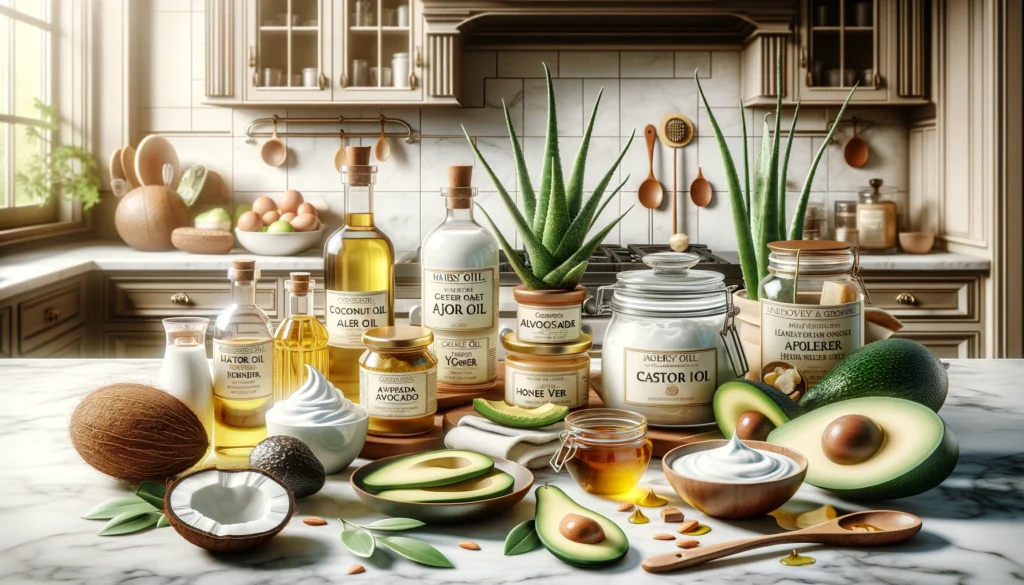
When it comes to achieving thicker and fuller hair DIY hair masks have become a game changer. Homemade hair masks offer benefits that often surpass those of hair care products. Here’s why they are increasingly becoming the choice, for hair care enthusiasts;
- Chemical Free: One major advantage of DIY hair masks is their natural composition. Unlike products that contain harsh chemicals and synthetic fragrances these masks are free from such ingredients reducing the risk of scalp irritation and damage to your hair. They provide an healthier alternative.
- Tailored to Your Hair Needs: DIY hair masks can be customized according to hair types and concerns. Whether you have oily or brittle hair you can choose ingredients that specifically target your issues. This level of personalization is not always possible with off the shelf products.
- Nourishing Treatments: Homemade hair masks are packed with vitamins, minerals and antioxidants that promote hair growth. Ingredients like avocado, coconut oil and honey are rich in nutrients that nourish the roots of your hair follicles helping them grow stronger and thicker.
- Cost Effective: Making your hair masks at home can save you a lot of money compared to buying hair treatments. Most of the ingredients you need are easily found in your kitchen or local stores making it a budget friendly way to achieve salon quality results.
- Promotes Overall Scalp Health: A healthy scalp is crucial, for hair growth. The natural ingredients used in DIY masks can help improve the health of your scalp leading to hair growth. Ingredients like aloe vera and yogurt have properties that soothe and balance the scalp creating an environment for hair to thrive.
- Environmentally Friendly: Opting to create your hair care treatments is also a conscious choice. Homemade masks reduce packaging waste. Contribute less, to the environmental impact caused by the production and transportation of commercial products.
Cardi B’s Hair Mask Breaks the Internet: Find Out Why Everyone’s Talking About It
In summary DIY hair masks offer an approach, to caring for your locks by providing nourishment without the use of harsh chemicals found in many commercial products.
Section 3: Key Ingredients for Hair Growth and Thickness
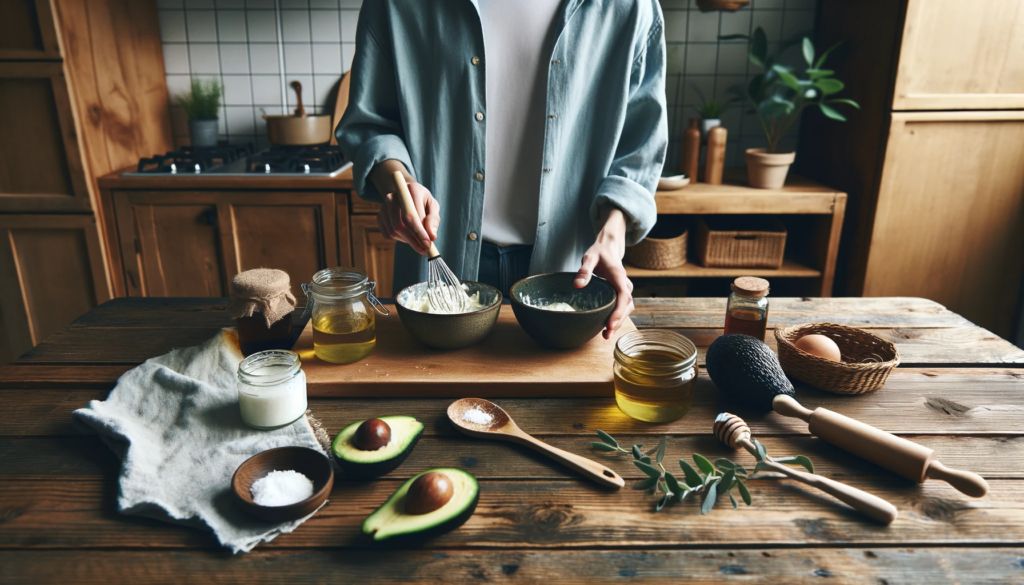
When it comes to creating an effective homemade hair mask for growth and thickness, the ingredients you choose are crucial. Each natural component brings its own set of benefits to the table. Here’s a look at some key ingredients that are not only easily accessible but are powerhouses when it comes to nourishing your hair:
1. Coconut Oil: A staple in many hair care routines, coconut oil is revered for its deep moisturizing properties. It penetrates the hair shaft, reducing protein loss and strengthening the hair. This oil is particularly beneficial for preventing hair breakage and split ends, contributing to hair length and thickness.
2. Castor Oil: Known for its hair growth-promoting qualities, castor oil is rich in ricinoleic acid, a type of fatty acid that stimulates the scalp, encouraging hair growth. It’s also excellent for adding volume to thin hair.
3. Aloe Vera: Aloe vera isn’t just for skin soothing; it’s also great for hair. Its enzymes promote a healthy scalp, which is essential for hair growth. Plus, it adds moisture and shine to the hair.
4. Avocado: Loaded with vitamins B and E, avocado works at the cellular level to protect and strengthen hair. Vitamin E helps repair damage on the scalp, which can slow or prevent hair growth, while Vitamin B is essential for hair growth.
5. Eggs: For those who don’t mind using eggs, they are a powerhouse of protein, essential for hair growth. They also contain biotin and other B vitamins that enhance hair strength and thickness.
6. Honey: A natural humectant, honey attracts moisture. It’s great for conditioning and adding shine to the hair, making it a perfect ingredient for hair masks aimed at enhancing thickness and growth.
7. Yogurt: Rich in protein and lactic acid, yogurt can help cleanse the scalp and induce smoother and shinier hair. It’s also known for its hair growth-stimulating properties.
Each of these ingredients can be used alone or combined with others for enhanced effects. In the next section, we’ll explore how to prepare and apply a basic homemade hair mask using these ingredients, tailored for your specific hair type and needs.
Section 4: Preparing Your Homemade Hair Mask
Now that we have explored the key ingredients, let’s dive into how to create an effective homemade hair mask. Here’s a basic recipe that you can customize according to your hair’s needs:
Basic DIY Hair Mask Recipe for Growth and Thickness:
Ingredients:
- 2 tablespoons of coconut oil (for moisture and strength)
- 1 tablespoon of castor oil (for growth stimulation)
- 1 tablespoon of honey (for moisture and shine)
- 1 ripe avocado (for vitamins and conditioning)
Instructions:
- Mash the Avocado: Start by mashing the ripe avocado in a bowl until it’s free of lumps.
- Mix the Oils and Honey: Add coconut oil, castor oil, and honey to the mashed avocado. Blend them together until you get a smooth mixture.
- Apply the Mask: Apply the mask to your hair, starting from the roots and working your way down to the tips. Ensure your hair is thoroughly coated.
- Leave it On: Cover your hair with a shower cap and let the mask sit for about 30 minutes. This allows the nutrients to penetrate deeply into your scalp and hair follicles.
- Rinse: Rinse out the mask with lukewarm water and follow up with your regular shampoo and conditioner routine.
Tips for Customization:
- For extra protein (especially for those with brittle hair), add an egg to the mix.
- If your scalp is prone to oiliness, reduce the amount of coconut oil and focus on the roots less when applying.
- For an extra soothing effect, add a few drops of lavender or rosemary essential oil.
This mask is designed to cater to most hair types and concerns. It incorporates ingredients known for their hair growth and thickness properties, and you can tweak it based on your personal hair care needs.
In the upcoming section, we’ll focus on egg-free options for those who prefer to avoid using eggs in their hair masks.
Section 5: Special Focus – Egg-Free Options
While eggs are a popular ingredient in hair masks due to their high protein content, not everyone prefers to use them. Whether it’s due to allergies, scent, or personal preference, there are plenty of effective egg-free alternatives. Here are some egg-free homemade hair mask recipes that are just as effective for promoting hair growth and thickness:
1. Banana and Honey Mask:
- Ingredients:
- 1 ripe banana (for moisture and softness)
- 2 tablespoons of honey (for shine and moisture retention)
- 1 tablespoon of olive oil (for nourishment and strength)
- Instructions:
- Mash the banana in a bowl until smooth.
- Add honey and olive oil to the mashed banana and mix well.
- Apply the mask to your hair, ensuring even coverage.
- Leave it on for 20-30 minutes, then rinse with lukewarm water and shampoo.
2. Yogurt and Aloe Vera Mask:
- Ingredients:
- ½ cup of plain yogurt (for protein and lactic acid)
- 2 tablespoons of aloe vera gel (for scalp health and moisture)
- 1 tablespoon of coconut oil (for moisture and strength)
- Instructions:
- Mix yogurt, aloe vera gel, and coconut oil in a bowl.
- Apply the mixture to your hair, focusing on the roots and lengths.
- Leave the mask on for about 30 minutes.
- Rinse off with cool water and shampoo as usual.
3. Avocado and Coconut Milk Mask:
- Ingredients:
- 1 ripe avocado (for conditioning and vitamins)
- ½ cup of coconut milk (for hydration and growth promotion)
- 1 tablespoon of olive oil (for strength and shine)
- Instructions:
- Blend the avocado and coconut milk until smooth.
- Stir in the olive oil.
- Apply the mixture to your hair, ensuring thorough coverage.
- Leave it on for 30 minutes before rinsing with lukewarm water and shampooing.
These egg-free masks are perfect for those looking for natural alternatives to nurture their hair. They are packed with ingredients that promote hair growth, thickness, and overall scalp health.
Large Knotless Braids: The Ultimate Hair Hack for Healthy, Gorgeous Locks
Section 6: Application Tips for Maximum Benefits

Applying a hair mask correctly is just as important as choosing the right ingredients. To ensure that you reap the full benefits of your homemade hair mask, here are some tips for effective application:
1. Start with Clean Hair: Ideally, apply the mask to freshly washed hair. This helps the hair and scalp absorb all the nutrients more effectively since there’s no build-up of oils or products.
2. Apply Generously and Evenly: Use your fingers or a hair mask brush to apply the mask. Start from the scalp and work your way down to the ends of your hair. Ensure that all strands are evenly coated, paying extra attention to the tips, as they are usually the most damaged part of the hair.
3. Massage Your Scalp: Spend a couple of minutes massaging the mask into your scalp. This not only ensures that the scalp absorbs the nutrients but also stimulates blood flow, which can aid in hair growth.
4. Use Heat to Enhance Absorption: After applying the mask, cover your hair with a shower cap. You can also wrap your head with a warm towel. The heat helps open up the hair cuticles, ensuring deeper penetration of the nutrients.
5. Timing is Key: Leave the mask on for at least 20-30 minutes. However, for deeper conditioning, you can leave it on for up to an hour. Be cautious not to overdo it, especially if your hair is protein-sensitive.
6. Rinse Thoroughly: Rinse the mask out with lukewarm water. Avoid hot water as it can strip away essential oils from your hair. After rinsing, you can follow up with your regular shampoo and conditioner routine if needed.
7. Be Consistent: For best results, apply a hair mask once a week. Consistency is crucial when it comes to hair care. Regular application will yield better and longer-lasting results.
By following these application tips, you’ll ensure that your homemade hair masks work effectively, helping you achieve the desired results in hair growth and thickness.
Section 7: Real Experiences and Results

Hearing about the real experiences and results of others can be incredibly motivating when it comes to trying out homemade hair masks. Over time, many individuals have shared their success stories, which highlight the effectiveness of these natural remedies for hair growth and thickness.
1. Personal Testimonials: Online forums, beauty blogs, and social media are replete with personal anecdotes about the wonders of homemade hair masks. For instance, numerous users have reported significant improvements in hair thickness and texture after consistently using masks with ingredients like coconut oil and honey.

2. Before and After Comparisons: Some users have documented their hair journey with ‘before and after’ photos that showcase remarkable changes. These visual proofs often reveal healthier, thicker, and more vibrant hair, offering tangible evidence of the benefits of regular use of natural hair masks.
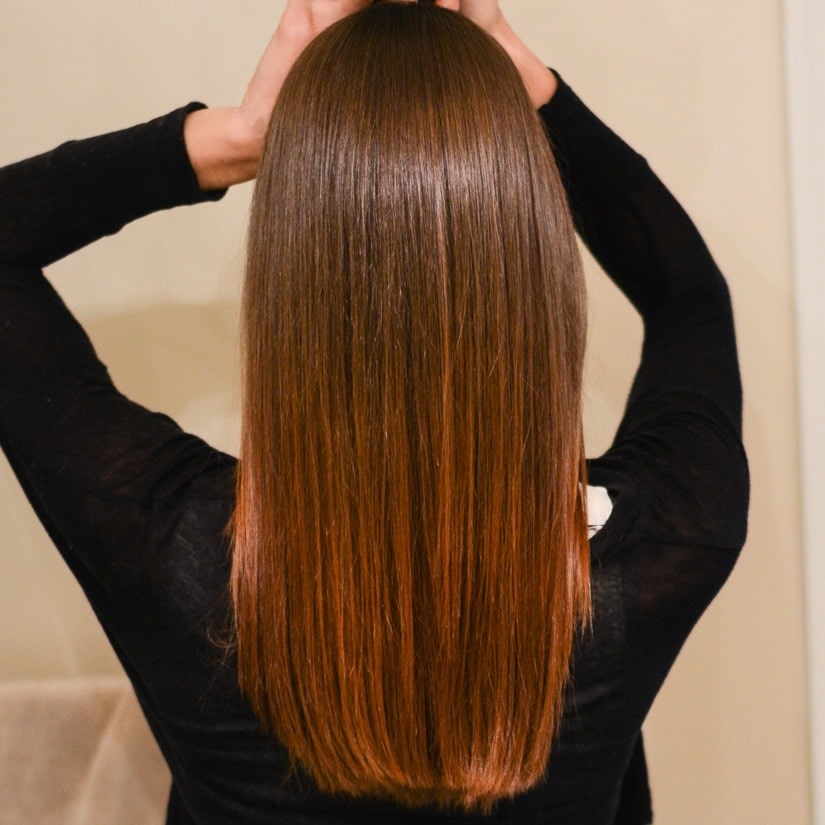
3. Expert Endorsements: Hair care professionals and trichologists sometimes also endorse certain natural ingredients for hair care. Their professional insights provide a level of trust and credibility to the effectiveness of these DIY treatments.
4. Diverse Hair Types and Needs: Importantly, these real-life experiences come from a wide range of hair types and conditions, demonstrating the versatility and adaptability of homemade hair masks to different hair care needs.
While individual results may vary, and what works for one person might not work for another, the plethora of positive experiences serves as a testament to the potential of these natural, homemade remedies in enhancing hair health.
The Benefits of Wild Growth Hair Oil for Hair Growth
Section 8: Precautions and Best Practices
While homemade hair masks are generally safe and beneficial, it’s important to follow certain precautions and best practices to ensure you get the best results without any adverse effects:
1. Patch Test: Before applying any new ingredient to your hair or scalp, perform a patch test. Apply a small amount of the mixture to your inner arm or behind your ear and wait for 24 hours to check for any allergic reactions.
2. Quality of Ingredients: Always use fresh and high-quality ingredients. Rancid oils or overripe fruits may not provide the desired benefits and can even harm your hair.
3. Be Aware of Individual Reactions: Everyone’s hair is different. An ingredient that works wonders for one person may not have the same effect on another. Pay attention to how your hair and scalp react to each mask.
4. Avoid Overuse of Protein: While protein is essential for hair strength, too much protein can make hair brittle and lead to breakage. If you notice your hair becoming stiff or straw-like, reduce the frequency of protein-rich masks.
5. Balance with Moisture: If you’re using protein-rich ingredients, balance them with moisturizing ingredients like oils or honey to maintain the protein-moisture balance in your hair.
6. Don’t Overdo It: Using hair masks too frequently can lead to product build-up, weighing down your hair. Stick to using masks once a week or as needed.
7. Rinse Thoroughly: Ensure that you rinse out the mask completely to avoid any residue, which can attract dirt and cause scalp issues.
8. Adjust Recipes as Needed: Feel free to adjust the quantities or ingredients based on your hair length, type, and condition. Personalization is key in DIY hair care.
By following these precautions and best practices, you can enjoy the numerous benefits of homemade hair masks safely and effectively.
Conclusion
Embarking on the path of natural hair care, through DIY hair masks can be a fulfilling and transformative experience. As we have explored these masks not encourage hair growth and thickness. Also provide a chemical free budget friendly and personalized approach to taking care of your hair. The magic of ingredients when combined with the techniques and practices can truly make a noticeable difference in the health and appearance of your locks.
From the nourishing properties of coconut oil to the strengthening benefits of castor oil along with options that don’t involve eggs there is a range of choices available to cater to different hair types and needs. Remember, maintaining consistency and paying attention to your hair requirements are factors, for successful hair care.
We encourage you to try out the recipes and suggestions shared in this blog post. Embrace the journey of discovering what works best for your tresses and relish in the pursuit of thicker and more radiant hair.
Final Words!
Now that you’re equipped with the knowledge and recipes for homemade hair masks, we’d love to hear about your experiences! Share your favorite recipes, tips, or before-and-after stories in the comments. If you have any questions or additional insights, feel free to contribute to the conversation. Your input could be invaluable to someone else on their hair care journey.
Happy masking, and here’s to your hair’s health and vitality!


